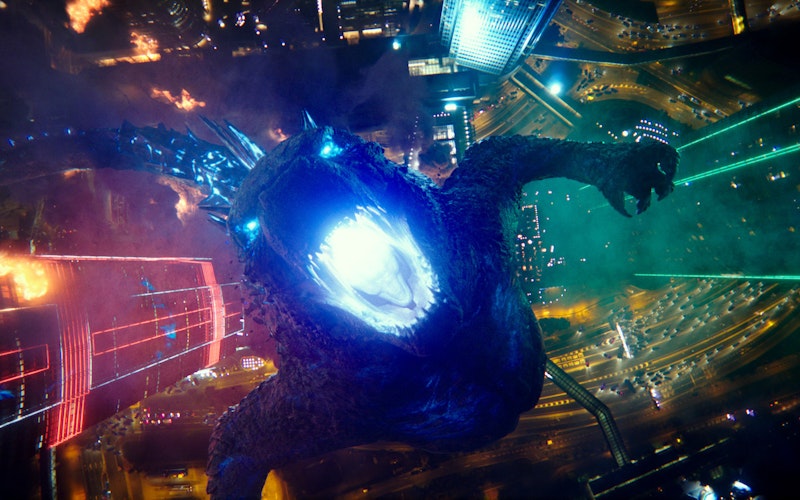
Movies
Kaiju Idols
Cinematic universes aren't inevitable (take the failed Dark Universe, for instance). But if a studio is able to sustain a series of films for at least three movies, one thing is inevitable: the heroes are going to fight each other.
Thor, Captain America, and Iron Man traded blows in Captain America: Civil War. Batman fought Superman at the dawn of justice. And the titular, titanic alpha kaiju of Warner Bros.’ MonsterVerse finally trade blows in Godzilla vs. Kong. Beyond the thrill of city-leveling spectacle that looks better than ever (and even takes place in daylight!), the film uses the tropes of a “versus” film to meditate on the dangers of human hubris in a world more mysterious than we are capable of knowing.
Though Godzilla originated in Japan as an atomic-age allegory, he could have been lifted straight from the book of Job. Throughout long arguments with his friends, Job repeatedly insists that his suffering is not due to his lack of faith. Rather, he claims that if God would only show up God would affirm Job's righteousness and offer some heretofore unknown explanation for Job's misery. When God finally does arrive, what we actually get is a whirlwind tour of the cosmos, including an invitation to consider titanic creatures—the Behemoth and Leviathan—from Ancient Near Eastern mythology. In Job 41, God waxes eloquently about the Leviathan, describing scales that are invulnerable to human weaponry and breath of fire. (Atomic breath, anyone?) Replace Job’s swords and spears with fighter jets and rifles, replace arrows and stones with missiles and bullets, and you've got Godzilla in a (titanic) nutshell.
God's challenge to Job isn't mere cosmic posturing; rather, God reminds Job of his creatureliness. Job is not, in fact, God. If Job (and by extension, we the readers) cannot understand how creation is the answer to Job's suffering, it is evidence that we are creatures embedded in the creation and not the creator and origin. In other words, we're not capable of comprehending, precisely because we're not God.
Godzilla, Kong, and their kaiju siblings represent the impossible scope of the cosmos. They are ancient, belonging to a world beyond human comprehension. (In Godzilla vs. Kong, this is the “hollow earth” that was teased in previous installments and shown here.) They live above and before and beyond humankind. What happens when we don't embody the space in our world to which God appointed us? What happens when, like Job's friends, we decide to speak for or even play God? (Spoilers ahead.)
TC Podcast: Biblical Beasts (Godzilla vs. Kong, Becoming Alien)
In Godzilla vs. Kong, this hubris is embodied by tech CEO Walter Simmons (a terrific, scenery-chewing Demian Bichir). Three peace-filled years after the events of Godzilla: King of the Monsters, Godzilla attacks the Florida panhandle for reasons we don’t immediately understand. But later we learn that Simmons cannot abide humanity not being the planet's dominant species and has built a God(zilla) killer: Mechagodzilla. This man-made monstrosity is the reason our titans quash their beef in the film’s climax and team up (as must happen in “versus” movies). It turns out the human mind cannot inhabit a kaiju body, and so the Mechagodzilla pilot (Shun Ojuri) dies, leaving the mechanical body to be possessed by the spirit of another kaiju, King Ghidora. (Don't worry, it doesn't make sense in the film either.)
Despite the plot gymnastics, this is as apt a picture of idolatry as we could hope to find in cinema. Whether the serpent of Genesis 3 or the beast of Revelation 13, idols whisper that we can be like God. Rather than trust the one who made us and appointed us to our place in the world, humanity turns to idols. These idols promise us the power of God, the power to remake the world in our image. Instead, they kill us and invite death into our world.
So too, Mechagodzilla overpowered his creators and turned on humanity. Godzilla’s wrath turns out to have been well-founded. The spirit (of Ghidora) that deceived Simmons turns out to be evil, uncontrollable, and bent on human destruction. So too, the spirits of our world that the author of Ephesians called the “powers” and “spiritual forces” do not want good for us. They deceive us so they can destroy us, as Paul observes in Romans 7. No wonder he cries out, “What a wretched man I am! Who will rescue me from this body that is subject to death?”
We are fortunate this is where the parallels end. Our savior is not a kaiju leveling cities to establish his alpha dominance. Rather, we find our hope in the creator who wins by losing, whose glory is revealed not in the terror of his violence but in the depths of his infinite love. As Paul goes on to claim in answer to his own question, “Thanks be to God, who delivers me through Jesus Christ our Lord!”
Topics: Movies